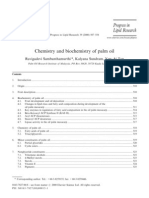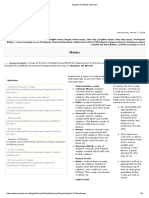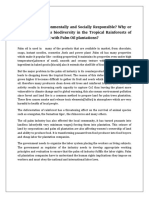Sustainable Palm Oil - Pro
Sustainable Palm Oil - Pro
Uploaded by
Kartiban ₇ AsokanCopyright:
Available Formats
Sustainable Palm Oil - Pro
Sustainable Palm Oil - Pro
Uploaded by
Kartiban ₇ AsokanOriginal Description:
Copyright
Available Formats
Share this document
Did you find this document useful?
Is this content inappropriate?
Copyright:
Available Formats
Sustainable Palm Oil - Pro
Sustainable Palm Oil - Pro
Uploaded by
Kartiban ₇ AsokanCopyright:
Available Formats
SUSTAINABLE PALM OIL
A CHALLENGE PRO
KARTIBAN ASOKAN
SITI INSYIRAH BINTI ALI
JUWAIRIAH BINTI HARIS
THARANI A/P RENGASAMY
ANAS MOHAMMED
KORNTIP KOKYAI
INTRODUCTION
Increasingly common raw material for food and
non-food product
1 in 10 products contains palm oil in some form
The demand of palm oil have increased due to
usage in bio-fuel, thus it becomes 2
nd
most
consumed oil after soybean oil
Its cheaper, easier to store(room temperature)
WHAT HAPPENS DUE TO FARMING OF PALM OIL
Loss of rainforest in Malaysia and Indonesia,
tropical forest and peat land are cleared
Within the next 15 years almost all of the rainforest
will be disappeared
Disappearance of rare species, Orangutan and
Sumatran tigers
Escalate the climate change
HOW TO HAVE A SUSTAINABLE PALM OIL ???
In 2001, the WWF had set up The Roundtable on Sustainable Palm Oil (RSPO)
To establish standards for producing and procuring palm oil in a sustainable
manner
RSPO promotes the production and uptake of sustainable palm oil through
cooperation and open dialogue with its stakeholders with the ultimate goal of
transforming markets to make sustainable palm oil the norm
the most advanced standard setting platform that is dedicated to the
sustainable production of a single commodity
Today, the RSPO comprises 1,400 members covering the entire supply chain of
an extensively used and traded commodity
As of late 2013, there are 14 Malaysian plantation companies with 105 palm
oil mills that are RSPO-certified.
QUESTION 1
The Roundtable on Sustainable Palm
Oil is a multi-stakeholder initiative.
What actors need to be part of the
initiative for the problem to be
addressed in an effective way?
Stakeholder
categories within
RSPO
Palm oil
growers
Palm oil
processors
and traders
Bank and
investors
Consumer
goods
manufacturers
Retailers
Social and
development
NGOs
Environmental
NGOs
Develop, gather and publish
uniform ESG performance
data
Undertake awareness raising
and more in-depth education
Share and develop best
practice analytical and
investment tools
Be flexible in its membership
cost
Clarify what the RSPO requires in
terms of commitments and actions
to transform the palm oil industry
Stakeholders Action
Asset Owners Refine Requests for Proposals to include ESG and palm oil
specific criteria.
Asset Managers Engage collaboratively with their Asian counterparts.
Buy-side Analysts Fund detailed coverage from specialist research providers.
Sell-side Analysts Include material ESG risks and opportunities into their
analysis.
Investee Companies Respond to analyst requests for ESG metrics being
reported.
Financial Intermediaries Support decision-making tools with impactful reporting.
Extra-financial Research
Providers
Supply regular and consistent ESG content beyond
questionnaires
Market Data Providers Embed metrics and key performance indicators for CSPO.
NGO Community Provide succinct key performance indicators, tools and
research.
RSPO Work on data transparency.
QUESTION 2
WHAT IS HINDERING THE
DEVELOPMENT OF SUSTAINABLE
PRACTICES IN THE PRODUCTION OF
PALM OIL?
ENVIRONMENTAL SIDE EFFECTS
Oil palm cultivation on land that was previously covered with peat-swamp
forests, primary forests or other high conservation value areas.
Such areas, already under pressure from other factors such as logging, are
highly valued for their biodiversity and their capacity to sequester carbon
dioxide.
Forest parcels are sometimes cleared by fires, which can burn out of
control.
The building of roads through forests has been blamed for hindering the
migration of endangered species and exposing them to human activities.
SOCIAL SIDE EFFECTS
Increasing number of communities who legally farming/living in the
plantation affecting the area of plantation.
Several reports of plantations that violates workers right (e.g: fair
payment, safe working condition, freedom to unionize)
QUESTION 3
WHAT DEVELOPMENT HAVE
TO TAKE PLACE TO MAKE THE
PRODUCTION OF PALM OIL
MORE SUSTAINABLE?
Choose certified sustainable palm oil
What is certified sustainable palm oil?
Palm oil that was certified by the RSPO through criteria that can help to
reduce the negative impacts of palm oil cultivation on the environment and
communities
Buy the products with certified sustainable palm oil indirectly can encourage
nature conservation
No primary forests or areas which contain significant concentrations of
biodiversity (e.g. endangered species) or fragile ecosystems, or areas which
are fundamental to meeting basic or traditional cultural needs of local
communities (high conservation value areas), can be cleared.
Socially acceptable
Technologically appropriate
Economically viable
Environmentally compatible
Conclusion
VEGETABLE OILS ARE INCREASINGLY POPULAR
Source : Roundtable on Sustainable Palm Oil
(RSPO),2012
WHY IS PALM OIL SO POPULAR?
Source : Roundtable on Sustainable Palm Oil
(RSPO),2012
Relatively
cheap
Most
widely
produced
Most
versatile
Highest
yielding
Why say yes to sustainable palm oil instead of no to palm
Source : Roundtable on Sustainable Palm Oil
(RSPO),2012
Fulfills increasing global food demand
Supports affordable food prices
Supports poverty reduction
Safeguards social interests, communities and workers
Protects the environment and wildlife
Why say yes to sustainable palm oil instead of no to palm
Source : Roundtable on Sustainable Palm Oil
(RSPO),2012
Producers will
switch to other
oils which
require 4-10
times more
land for the
same amount
of output as
palm oil
Producers will
switch to other
oils which are
relatively move
expensive
Livelihoods
and income
will be
impacted as oil
palm is widely
cultivated by a
significant
number of
smallholders in
developing
nation
Social issues
will just shift to
other vegetable
oils that face
similar
concerns
CONSEQUENCES OF ERADICATING PALM OIL
Source: http://www.betterpalmoil.org/what
Why say yes to sustainable palm oil instead of no to palm
Source: http://www.betterpalmoil.org/what
GETTING GREENER
You might also like
- Study Guide: Part One-Identifying Accounting TermsDocument4 pagesStudy Guide: Part One-Identifying Accounting TermsJames SargentNo ratings yet
- Case Study Palm Oil Refinery NewDocument2 pagesCase Study Palm Oil Refinery NewFong Leong Chee 馮亮智100% (3)
- 2011 PipocDocument42 pages2011 PipocBung Harun50% (2)
- RSPO Presentation ExtendedDocument42 pagesRSPO Presentation Extendedwahyu-aji-pamungkasNo ratings yet
- WWF Palm Oil Scorecard 2016Document59 pagesWWF Palm Oil Scorecard 2016edienews100% (1)
- Sunflower OilDocument7 pagesSunflower OilSurya AgarwalNo ratings yet
- Design and Analysis of Energy Efficient IntegratedDocument9 pagesDesign and Analysis of Energy Efficient IntegratedAbyan100% (1)
- Feasibility Report of Oil Mill Firm PDFDocument41 pagesFeasibility Report of Oil Mill Firm PDFAnisurrahman Khan100% (1)
- Crude Palm OilDocument68 pagesCrude Palm OilGlora imanuel100% (1)
- Palm Oil ProcessingDocument59 pagesPalm Oil ProcessingMarco TobingNo ratings yet
- Insights Reg PlantationsDocument69 pagesInsights Reg PlantationsNasya YenitaNo ratings yet
- Palm Oil Mill Bio RefinerDocument21 pagesPalm Oil Mill Bio Refinerajeculture100% (2)
- Palm Oil Fresh Fruit Bunches To Palm Kernel ExpellerDocument4 pagesPalm Oil Fresh Fruit Bunches To Palm Kernel ExpellerSafwan Ghafar100% (1)
- Standard Methods For Analysis of Rubber Palm Oill Mill Effluent 24112019Document46 pagesStandard Methods For Analysis of Rubber Palm Oill Mill Effluent 24112019mimi rahmatanNo ratings yet
- Case Study - PALM OILDocument36 pagesCase Study - PALM OILfebri monicaNo ratings yet
- Chemistry and Biochemistry of Palm OilDocument52 pagesChemistry and Biochemistry of Palm Oiljayengsumangat100% (2)
- Catalogue Bleaching EarthDocument3 pagesCatalogue Bleaching EarthGiuliano Castellani CiodaroNo ratings yet
- MENSTRAT - CH2 - Analyzing The External EnvironmentDocument33 pagesMENSTRAT - CH2 - Analyzing The External EnvironmentSjifa Aulia100% (1)
- New Revolution of CompostingDocument16 pagesNew Revolution of CompostingRizki Fajar KurniawanNo ratings yet
- Paper3 DR Choo PDFDocument49 pagesPaper3 DR Choo PDFzaedmohdNo ratings yet
- Building An Organization Capable of Good Strategy Execution: People, Capabilities, and StructureDocument47 pagesBuilding An Organization Capable of Good Strategy Execution: People, Capabilities, and StructureMI chowdhuryNo ratings yet
- Presentasi RILO - Sosialisasi RSPO Di BSP - 7 Apr08Document27 pagesPresentasi RILO - Sosialisasi RSPO Di BSP - 7 Apr08Karis SyaputraNo ratings yet
- Palm Oil Boom in IndonesiaDocument13 pagesPalm Oil Boom in IndonesiaHotib PerwiraNo ratings yet
- Jaypee Soybean Staus ReportDocument48 pagesJaypee Soybean Staus ReportNIKHIL SINGHNo ratings yet
- Sime Darby SlideDocument13 pagesSime Darby SlideHanis HazwaniNo ratings yet
- Initial Public Offer (IPO) : Presented By: Gaurav Kumar Mishra Deep Chatterjee Amit Kumar Kunal Vohra Manish ShuklaDocument21 pagesInitial Public Offer (IPO) : Presented By: Gaurav Kumar Mishra Deep Chatterjee Amit Kumar Kunal Vohra Manish ShuklaNishant Mishra100% (1)
- Oil and Fat Technology Lectures IIIDocument42 pagesOil and Fat Technology Lectures IIIaulger100% (1)
- VCO Brochure EngDocument4 pagesVCO Brochure EngYuneza MutyaraNo ratings yet
- Ch01 IntroductionDocument26 pagesCh01 IntroductionNoorNo ratings yet
- CKC TheWholeNut 2019-1Document42 pagesCKC TheWholeNut 2019-1arianne100% (1)
- Refining of Palm Oil A Review On Palm OilDocument5 pagesRefining of Palm Oil A Review On Palm OilAlexNo ratings yet
- Mango Kernel Oil: Profile No.: 179 NIC Code: 01221Document13 pagesMango Kernel Oil: Profile No.: 179 NIC Code: 01221Vikram PhalakNo ratings yet
- GVC-Palm OilDocument27 pagesGVC-Palm Oilsend2wish100% (1)
- CCC Coconut Manufacturing Work Flow 2011Document6 pagesCCC Coconut Manufacturing Work Flow 2011Thava Kumar DevanayagamNo ratings yet
- Industrial Process and The Environment - Crude Palm Oil IndustryDocument102 pagesIndustrial Process and The Environment - Crude Palm Oil IndustryWahyu Sutrisno100% (1)
- Future Prospects For Palm Oil Refining and Modifications: Innovation - TechnologieDocument8 pagesFuture Prospects For Palm Oil Refining and Modifications: Innovation - TechnologieDavi Khoirun NajibNo ratings yet
- Precourse Intro Oil Processing - 2016Document88 pagesPrecourse Intro Oil Processing - 2016JoelCariaz100% (2)
- The Role of Financial ManagementDocument30 pagesThe Role of Financial ManagementNoor DeenNo ratings yet
- Plantation Presentation - Sealing Only 11-07-2013Document72 pagesPlantation Presentation - Sealing Only 11-07-2013Jackson WongNo ratings yet
- Scribd 02 230411 CoconutDocument14 pagesScribd 02 230411 Coconutabenie100% (1)
- Materi Aset TetapDocument52 pagesMateri Aset TetapRamadhan HadisaputroNo ratings yet
- Development of A Palm Fruit Bunch Chopper and Spikelet StripperDocument7 pagesDevelopment of A Palm Fruit Bunch Chopper and Spikelet Stripperinventionjournals100% (1)
- PD Topic 2Document23 pagesPD Topic 2NityantiniNo ratings yet
- Product Spec Standard RBD CNODocument1 pageProduct Spec Standard RBD CNOTRC SalesNo ratings yet
- Edible OilDocument51 pagesEdible Oilashish100% (3)
- Plant Assets Natural Resources and Intangible AsDocument59 pagesPlant Assets Natural Resources and Intangible AsxunaidNo ratings yet
- Wine Project ReportDocument19 pagesWine Project Reportakhilashk100% (1)
- Enzymes For Improving Oil Yield in Palm Oil Extraction: World Congress On Industrial Biotechnology, MontrealDocument29 pagesEnzymes For Improving Oil Yield in Palm Oil Extraction: World Congress On Industrial Biotechnology, MontrealRonel MendozaNo ratings yet
- Indonesian Palm Oil Smallholders - Briefing PaperDocument11 pagesIndonesian Palm Oil Smallholders - Briefing PaperSri Wahyudi100% (1)
- XX Virgin Coconut Oil Emerging Functional Food OilDocument7 pagesXX Virgin Coconut Oil Emerging Functional Food OilTeguh Shaleh TahirNo ratings yet
- Case Study Report: Palm Oil in IndonesiaDocument59 pagesCase Study Report: Palm Oil in IndonesiaHamid Jahangir100% (1)
- MIGA PresentationDocument11 pagesMIGA PresentationjafwasNo ratings yet
- Angolan Oil Blends UpstreamDocument3 pagesAngolan Oil Blends UpstreamezioNo ratings yet
- Palm Oil Certification - VsentDocument26 pagesPalm Oil Certification - VsentRishabh SinghNo ratings yet
- Mr. Salahudin Yacoob - RspoDocument31 pagesMr. Salahudin Yacoob - Rspoinfo_thesisNo ratings yet
- Palm Oil Market and Sustainability in IndiaDocument28 pagesPalm Oil Market and Sustainability in IndiaNachiketa Das100% (1)
- Advanced ConversationDocument5 pagesAdvanced ConversationMurielle Musao OfficielNo ratings yet
- Literature Review On Palm Oil ProductionDocument7 pagesLiterature Review On Palm Oil Productionafmzubsbdcfffg100% (1)
- Why Not? How Has Biodiversity in The Tropical Rainforests of Indonesia Affected With Palm Oil Plantations?Document4 pagesWhy Not? How Has Biodiversity in The Tropical Rainforests of Indonesia Affected With Palm Oil Plantations?Lovey OberoiNo ratings yet
- 91BLGDocument9 pages91BLGTRC SalesNo ratings yet
- 1 Defining Marketing For The 21 CenturyDocument22 pages1 Defining Marketing For The 21 CenturyKartiban ₇ AsokanNo ratings yet
- Computer ApplicationDocument1 pageComputer ApplicationKartiban ₇ AsokanNo ratings yet
- OPERATION HOURS: 9.00AM-9.00PM CONTACT INFORMATION: 018-4893752 /03-68254568 Location:2, 1 Floor, Jalan Loke Yew 55200 Kuala LumpurDocument1 pageOPERATION HOURS: 9.00AM-9.00PM CONTACT INFORMATION: 018-4893752 /03-68254568 Location:2, 1 Floor, Jalan Loke Yew 55200 Kuala LumpurKartiban ₇ AsokanNo ratings yet
- Management: BMG 1024 Group Project Title of AssignmentDocument4 pagesManagement: BMG 1024 Group Project Title of AssignmentKartiban ₇ AsokanNo ratings yet
- Unit-I Two Marks Questions and Answers 1. Explain CIMDocument4 pagesUnit-I Two Marks Questions and Answers 1. Explain CIMKailashNo ratings yet
- Online Test Series: Jaiib Caiib Mock Test & Study Materias PageDocument83 pagesOnline Test Series: Jaiib Caiib Mock Test & Study Materias PageabhiNo ratings yet
- Assignmnet For Financial ManagementDocument1 pageAssignmnet For Financial Managementmanoj kumar DasNo ratings yet
- Seminar Assignment 2Document19 pagesSeminar Assignment 2Dhugassa AKeyuNo ratings yet
- MEMORANDUM OF AGREEMENT FOR WORK IMMERSION PARTNERSHIP Private CompanyDocument9 pagesMEMORANDUM OF AGREEMENT FOR WORK IMMERSION PARTNERSHIP Private CompanyErickson GlodoNo ratings yet
- Bollinger Bands (Part 1)Document6 pagesBollinger Bands (Part 1)Miguel Luz RosaNo ratings yet
- Lecture 12, Employee Separation & RetentionDocument23 pagesLecture 12, Employee Separation & RetentionSrabon AhmedNo ratings yet
- Neha Datta: ContactDocument4 pagesNeha Datta: ContactasdasdNo ratings yet
- Britannia Industries Ltd. ReportDocument22 pagesBritannia Industries Ltd. ReportZidan Zaif100% (1)
- Break Even Analysis TotalDocument3 pagesBreak Even Analysis Totalm.rahimianNo ratings yet
- A Cost Benefit Analysis To Explore The Optimal Number of Blast Movement Monitoring LocationsDocument9 pagesA Cost Benefit Analysis To Explore The Optimal Number of Blast Movement Monitoring LocationssikujuaNo ratings yet
- Purchasing: Can We Bridge The Gap Between Strategy and Daily Reality?Document11 pagesPurchasing: Can We Bridge The Gap Between Strategy and Daily Reality?Shripad KulkarniNo ratings yet
- HK V2 Exam 2 PMDocument31 pagesHK V2 Exam 2 PMHarsh KabraNo ratings yet
- Komponen SSH 200415Document4,055 pagesKomponen SSH 200415SDN 215 RancasagatanNo ratings yet
- Team 14 - Boeing 7E7Document10 pagesTeam 14 - Boeing 7E7sam30121989No ratings yet
- Risk Management and SolutionsDocument5 pagesRisk Management and SolutionsVictoria PitaNo ratings yet
- Lesson 2Document33 pagesLesson 2Alfredo ModestoNo ratings yet
- Literature Review of RBVDocument5 pagesLiterature Review of RBVaflshvifm100% (1)
- Sales Notes Articles 1545 Conditions and WarrantiesDocument3 pagesSales Notes Articles 1545 Conditions and WarrantiesEnzo OfilanNo ratings yet
- TLP621, TLP621: Programmable Controller Ac / DC Input Module Solid State RelayDocument10 pagesTLP621, TLP621: Programmable Controller Ac / DC Input Module Solid State RelayWill VasquezNo ratings yet
- Ifrs Unit 5Document12 pagesIfrs Unit 5Deven LadNo ratings yet
- WD Mexico LocalizationsDocument13 pagesWD Mexico LocalizationsJavier CandoNo ratings yet
- Legco Paper 4Document86 pagesLegco Paper 4Knu LongNo ratings yet
- TAKE HOME QUIZ Post Employment BenefitsDocument7 pagesTAKE HOME QUIZ Post Employment BenefitsqutateNo ratings yet
- DEED OF ABSOLUTE SALE - Portion of Hereditary Share Recabo-BARBASODocument3 pagesDEED OF ABSOLUTE SALE - Portion of Hereditary Share Recabo-BARBASOEulogio LagudasNo ratings yet
- Airlift Shut DownDocument4 pagesAirlift Shut DownFatima JavedNo ratings yet
- BA AssignmentsDocument12 pagesBA Assignmentssrv 99No ratings yet
- Business-Proposal (1) - 1Document28 pagesBusiness-Proposal (1) - 1paul abitonaNo ratings yet
- Business:: Management ProcessesDocument16 pagesBusiness:: Management ProcessesKhalifa Muhammad ArifNo ratings yet





























































































